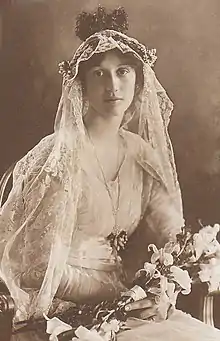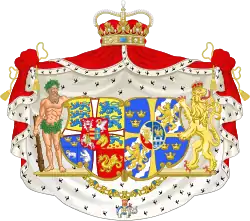| Margaretha of Sweden | |||||
|---|---|---|---|---|---|
| Princess Axel of Denmark | |||||
.png.webp) Margaretha in 1918 | |||||
| Born | 25 June 1899 Stora Parkudden, Djurgården, Stockholm, Sweden | ||||
| Died | 4 January 1977 (aged 77) Tranemosegård, Fakse, Zealand, Denmark | ||||
| Burial | |||||
| Spouse | |||||
| Issue | Prince Georg of Denmark Count Flemming of Rosenborg | ||||
| |||||
| House | Bernadotte | ||||
| Father | Prince Carl, Duke of Västergötland | ||||
| Mother | Princess Ingeborg of Denmark | ||||
Princess Margaretha of Sweden (Margaretha Sofia Lovisa Ingeborg; 25 June 1899 – 4 January 1977) was a member of the Swedish Royal Family by birth and the Danish Royal Family by marriage. She was the elder sister of Crown Princess Märtha of Norway and Queen Astrid of the Belgians.
Early life
Princess Margaretha was born on 25 June 1899 at her parents' summer residence, the Villa Parkudden, at Djurgården in Stockholm. The eldest child and daughter of Prince Carl, Duke of Västergötland, and Princess Ingeborg of Denmark, she was born Princess Margaretha of Sweden and Norway (later just "of Sweden", due to the dissolution of the union between Norway and Sweden in 1905).
In 1916 Margaretha's confirmation attracted enthusiastic press coverage; the event was said to mark the beginning of a new age for the Swedish royal house, which had lacked princesses for so long.
Marriage and family

On 22 May 1919, at the Storkyrkan, Stockholm, she was married to Prince Axel of Denmark, her maternal first cousin once removed. The marriage was a love match; her mother remarked that the couple were so much in love that they could not be left alone in a furnished room.[1] Her wedding was celebrated with great festivities in Stockholm.
They had two sons:
- Prince George Valdemar Carl Axel of Denmark (16 April 1920 – 20 September 1986); married Anne Bowes-Lyon, niece of Queen Elizabeth of the United Kingdom (née Lady Elizabeth Bowes-Lyon), on 16 September 1950.
- Prince Flemming Valdemar Carl Axel (9 March 1922 – 19 June 2002); married Alice Ruth Nielson, daughter of Kai Nielson and Edith Fischer, on 24 May 1949. They have four children, ten grandchildren and four great-grandchildren.
She was a maternal aunt of King Harald V of Norway and Kings Baudouin and Albert II of Belgium; and grandaunt of King Philippe of Belgium and Grand Duke Henri of Luxembourg.
Activities
Margaretha adjusted herself well in Denmark, which she had often visited on family occasions during her upbringing. She lived a private life devoted to her family on the estate Bernstorffshøj in Gentofte and generally avoided publicity, and kept in close contact with her relations abroad. She was interested in social issues in Sweden, and became the patron of several charity organisations in Denmark, and was the chairperson of Gentofte Børnevenner.
She was a leading guest at the 1947 wedding of Princess Elizabeth and Philip, Duke of Edinburgh.[2]
After the death of her sister Queen Astrid of Belgium in 1935, she became a great support for her sister's young children in Belgium. After the death of her other sister, the Norwegian Crown Princess Märtha in 1954, she also became a great support for her sister's children in Norway. She was the godmother of Astrid's grandchildren, the twins Prince Jean of Luxembourg and Princess Margaretha of Liechtenstein, as well as Märtha's daughter Princess Ragnhild, and granddaughter, princess Märtha Louise of Norway.
Her spouse died in 1964. As a widow, she was often back in Sweden, where she would join other members of the Swedish royal house in representative duties at official ceremonies — most notably, the Nobel Prize. To her family, she was affectionately known as "Tante Ta" ("Aunt Ta").
Arms
 Marital arms of Princess Margaretha of Sweden and Denmark |
.svg.png.webp) Arms as displayed in Riddarholmen Church in Stockholm |
Ancestry
| Ancestors of Princess Margaretha of Sweden | |||||||||||||||||||||||||||||||||||||||||||||||||||||||||||||||||||||||||||||||||||||||||||||||||||||||||||||||||||||||||||||||||||||||||||||||||||||||||||||||||||||||||||||||||||||||||||||||||||||||||||||||||||||||||||||||||||||||||||||||||||||||||||||||||||||||||||||||||||||||||
|---|---|---|---|---|---|---|---|---|---|---|---|---|---|---|---|---|---|---|---|---|---|---|---|---|---|---|---|---|---|---|---|---|---|---|---|---|---|---|---|---|---|---|---|---|---|---|---|---|---|---|---|---|---|---|---|---|---|---|---|---|---|---|---|---|---|---|---|---|---|---|---|---|---|---|---|---|---|---|---|---|---|---|---|---|---|---|---|---|---|---|---|---|---|---|---|---|---|---|---|---|---|---|---|---|---|---|---|---|---|---|---|---|---|---|---|---|---|---|---|---|---|---|---|---|---|---|---|---|---|---|---|---|---|---|---|---|---|---|---|---|---|---|---|---|---|---|---|---|---|---|---|---|---|---|---|---|---|---|---|---|---|---|---|---|---|---|---|---|---|---|---|---|---|---|---|---|---|---|---|---|---|---|---|---|---|---|---|---|---|---|---|---|---|---|---|---|---|---|---|---|---|---|---|---|---|---|---|---|---|---|---|---|---|---|---|---|---|---|---|---|---|---|---|---|---|---|---|---|---|---|---|---|---|---|---|---|---|---|---|---|---|---|---|---|---|---|---|---|---|---|---|---|---|---|---|---|---|---|---|---|---|---|---|---|---|---|---|---|---|---|---|---|---|---|---|---|---|---|---|---|---|
| |||||||||||||||||||||||||||||||||||||||||||||||||||||||||||||||||||||||||||||||||||||||||||||||||||||||||||||||||||||||||||||||||||||||||||||||||||||||||||||||||||||||||||||||||||||||||||||||||||||||||||||||||||||||||||||||||||||||||||||||||||||||||||||||||||||||||||||||||||||||||
References
Citations
- ↑ Staffan Skott: Alla dessa Bernadottar (All these Bernadottes) (1996) (in Swedish)
- ↑ "A Royal Wedding, 20 November 1947". Royal Collection. Retrieved 2014-03-06.
Bibliography
- "Margaretha". Svenskt Biografiskt Lexikon (in Swedish). Retrieved 2014-03-06.
- Bramsen, Bo (1992). Huset Glücksborg. Europas svigerfader og hans efterslægt [The House of Glücksburg. The Father-in-law of Europe and his descendants] (in Danish) (2nd ed.). Copenhagen: Forlaget Forum. ISBN 87-553-1843-6.
- Lerche, Anna; Mandal, Marcus (2003). A royal family : the story of Christian IX and his European descendants. Copenhagen: Aschehoug. ISBN 9788715109577.
